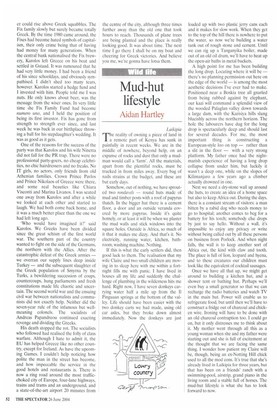Mud-hut lifestyle
Aldan Hartley
Laikipia The reality of owning a piece of land in a remote part of Kenya has sunk in painfully in recent weeks. We are in the middle of nowhere, beyond help, on an expanse of rocks and dust that only a madman would call a 'farm'. All the materials, apart from the plentiful rocks, must be trucked in from miles away. Every bag of nails strains at the budget, and these are but early days.
Somehow, out of nothing, we have sprouted two rondavels — round huts made of mud and timber posts with a roof of papyrus thatch. In the bigger hut there is a cement floor, a door and an outside veranda covered by more papyrus. Inside it's quite homely, or at least it will be when we plaster the mud walls and stick windows into the square holes. Outside is Africa, so much of it that it makes me dizzy. And that's it. No electricity, running water, kitchen, bathroom, washing machine. Nothing.
If this is what the early settlers did, then good luck to them. The realisation that my wife Claire and two small children are moving in to sleep here with me within a fortnight fills me with panic. I have lived in houses all my life and suddenly the challenge of plumbing in the wilderness hits me hard. Right now, I have seven donkeys carrying water half a mile up from the II Pinguaan springs at the bottom of the valley. Life should have been easier with the two donkey carts we had made, using old car axles, but they broke down almost immediately. Now the donkeys are just loaded up with two plastic jerry cans each and it makes for slow work. When they get to the top of the hill there is nowhere to put the water, so now we're building a water tank out of rough stone and cement. Until we can rig up a Tanganyika boiler, made out of an old oil drum, well have to heat up the open-air baths in metal buckets.
A high point for me has been building the long drop. Locating where it will be — there's no planning permission out here on the edge of the world — is among the most aesthetic decisions I've ever had to make. Positioned near a Boskia tree all gnarled from being rubbed against by elephant, our kazi will command a splendid view of the wooded Palaglan valley down towards a large dam, with the Karisiya hills slung blueishly across the northern horizon. The hole the labourers have dug for the long drop is spectacularly deep and should last for several decades. For me, the most important thing is constructing a European-style loo on top — rather than a slit in the floor — with a very strong platform. My father once had the nightmarish experience of having a long drop collapse from under him, but luckily it wasn't a deep one, while on the slopes of Kilimanjaro a few years ago a climber actually drowned in one.
Next we need a dry-stone wall up around the huts, to create an idea of a home space but also to keep Africa out. During the days, there is a constant stream of visitors: a man bitten by a rabid dog who needs money to go to hospital; another comes to beg for a battery for his torch; somebody else drops by just to say hello. Without a wall, it's impossible to enjoy any privacy or write without being called out by all these persons on business from Porlock. And when night falls, the wall is to keep another sort of Africa out, the kind with claw and tooth. The place is full of lion, leopard and hyena, and to these creatures our children must look like the equivalent of cocktail sausages.
Once we have all that up, we might get around to building a kitchen hut, and a shower tent or bathing hut. Perhaps we'll even buy a small generator so that we can recharge the radio batteries and watch TV in the main hut. Power will enable us to refrigerate food, but until then we'll have to construct a fridge out of charcoal and chicken wire. Ironing will have to be done with an old charcoal contraption too. I could go on, but it only distresses me to think about it. My mother went through all this as a young woman when she and my father were starting out and she is full of excitement at the thought that we are facing the same thing. I wonder how patient my Claire will be, though, being an ex-Notting Hill chick used to all the mod cons. It's true that she's already lived in Laikipia for three years, but that has been on a friends' ranch with a swimming-pool, airstrip, grand piano in the living room and a stable full of horses. The mud-hut lifestyle is what she has to look forward to now.


































































 Previous page
Previous page